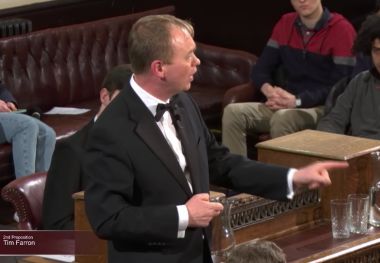Why a recent Cambridge debate bodes ill for the future of Christianity in Britain

The recent vote at the Cambridge Union debating society against the motion 'This House would go to Church' bodes ill for the future of public Christianity in Britain.
Evangelical Christian MP Tim Farron and Anglican journalist Peter Hitchens went up against celebrated LGBT activist Peter Tatchell and lost the vote by 152 to 81. There were 70 abstentions.
Why does a vote at a student debating society in 2022 matter?
Because the Cambridge University students who agreed that the Church is a force for evil in the world are likely to become the politicians, lawyers, media opinion formers, educationalists and 'woke' business leaders of 2042.
Having watched the debate in full I would suggest the fundamental reason the motion fell was because Tatchell successfully demonstrated that historic Christianity runs contrary to the sexual revolution.
Tatchell and company had won that culture war by the time New Labour came to political power in 1997. He has now become a father figure to the new generation of cultural revolutionaries at a top university like Cambridge. These young people are smart enough to see that Christianity in its orthodox form is a counter-revolutionary presence. I would say 'force' but that would be too strong a word for a movement that has become so marginal in the post-Christian culture of the Western world.
Hitchens' brand of formal Anglicanism, which he attempted to sell that evening, was never going to inspire the young people in the chamber. It was unfortunate that he was rude about Tim Farron's church, describing it as 'happy-clappy'.
In fact, the independent evangelical church Farron attends in the Cumbria town of Kendal is a faithful and lively Bible-teaching church with a decent number of young people involved. That unfortunately cannot be said of too many Church of England churches.
Farron's speech, I would suggest, was more young-people-friendly than Hitchens'.
"You don't have to be in church to be a Christian. Going into a church no more makes you a Christian than me going into Gregg's makes me a pasty," he said to laughter around the chamber.
But as in the 2017 General Election campaign when he led the Liberal-Democrats and the BBC interrogated him about his belief in the traditional Christian sexual ethic, he was unable to defend it articulately.
When interrupted by Tatchell quoting the Old Testament book of Leviticus and claiming that the Bible demands that LGBT people be put to death, Farron failed to point out that no-one in that chamber was being asked to get into a time machine and go back to ancient Israel to live under the Mosaic Law.
He should have made clear that the New Testament, whilst condemning homosexual practice, nowhere calls on the civil powers to execute homosexual people. He should have commended the New Testament's teaching on man-woman marriage and sexual love within it as a counter-cultural, transformative ethos for the common good.
It was unfortunate that the Christian cause did not have more persuasive and better theologically-educated advocates in the debate. But one suspects that the motion was already lost in the minds of the young voters before they turned up.
Tatchell and co have done their work too well.











